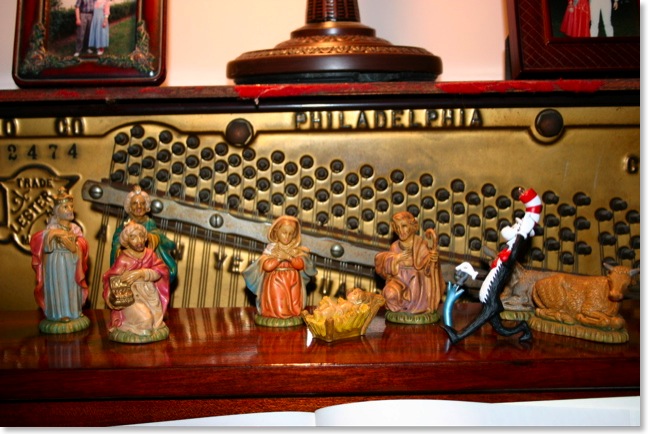It's That Time of Year Again!
To take the quiz, click HERE. Be sure to click "Done" at the end of the quiz so you can see whether your answers are right or wrong.
Stop Blaming the Innkeeper--the TNIV Gets It Right Again
“and she gave birth to her firstborn, a son.
She wrapped him in cloths and placed him in a manger,
because there was no guest room available for them.”
(Luke 2:7 TNIV)
I can still hear Jim Blevins, one of my old NT profs from way back, lamenting the fact that the Bethlehem innkeeper has gotten a bad rap all these years for supposedly being so heartless toward Mary and Joseph--making them stay in the barn rather than finding a room at the local Motel 6! The Bethlehem innkeeper has been the villain in Christmas pageants down through the centuries--but it was all based on poor translation!
Kατάλυμα/kataluma is better understood as a family guest room rather than an inn (and the first century inn wasn't anything like we think of as an inn anyway, but that's another subject). More than likely because Joseph, as well as many of his extended family, was traveling back to his ancestral village, the extra rooms in his relatives' homes were full. He and Mary may have also arrived late because no doubt traveling during the ninth month of pregnancy would have slowed their journey. One might wonder why one of Joseph's relatives would not have given up his spot in the guest room, especially considering Mary's condition. However, one can speculate that Mary may have been shunned by Joseph's family members who would have probably heard that she was pregnant out of wedlock.
Craig S. Keener notes in the IVP Bible Background Commentary: New Testament (p. 194),
The word traditionally translated "inn" probably means "home" or "guest room"; with all Joseph's scattered family members returning home at once, it is easier for Mary to bear (or care for the child after birth) in the vacant cave outside.
But maybe it wasn't a cave. Ben Witherington III notes in the "Birth of Jesus" entry of the Dictionary of Jesus and the Gospels the following:
A second crucial point is how one translates kataluma in Luke 2:7. The word can mean guest room, house or inn. It can be doubted whether there would have been an inn in Bethlehem in Jesus’ day since it was not on any major road, and inns normally were to be found only on major roads, especially the Roman ones (but cf. Jer 41:17, which does not refer to a place in Bethlehem). Furthermore, when Luke wants to speak of a commercial inn he uses pandocheion; 10:34 refers to an establishment found on the major road between Jerusalem and Jericho. Also, when Luke uses the word kataluma in his Gospel (22:11 and par.; cf. 1 Kings 1:18), it clearly does not mean an inn but a guest room. It is also worth pointing out that the Arabic and Syriac versions of the NT have never translated kataluma as inn.
It becomes more likely that by kataluma Luke means either house or guest room, and the latter translation must have the edge precisely because in the vast majority of ancient Near-Eastern peasant homes for which we have archaeological and literary evidence, the manger was within the home, not in some separate barn. The animals as well as the family slept within one large enclosed space that was divided so that usually the animals would be on a lower level, and the family would sleep on a raised dais (Bailey). In this particular case, we should probably envision Mary and Joseph staying in the home of relatives or friends, a home which was crowded due to the census being taken, a home where Luke tells us there was no longer any room in “ the guest room” (noting the definite article before the noun). Consequently, Mary gave birth to her child perhaps in the family room and placed the baby in the stone manger. This means that a good deal of the popular conception of this scene has no basis in the text. In particular, the idea of Mary and Joseph being cast out from civilized accommodations and taking up temporary residence in a barn is probably based on a misunderstanding of the text.
Regardless, Luke 2:7 stands as another testimony to the accuracy of the TNIV for translating κατάλυμα correctly in contrast to the mistranslation in almost every other major Bible version (the NLTse gets it right by using the word lodging which could imply either meaning). I'm glad the translators finally caught up with what dear old Dr. Blevins had been saying for decades. And now we can finally give that poor old innkeeper the break he deserves.
Free Christmas Story Podcast from the Bible Experience
Clicking on the image below (reproduced from Zondervan's website) will automatically launch iTunes. You do have iTunes loaded onto your computer don't you?
If you would prefer not to use iTunes, you can download an mp3 file, and you can also click here to see the "Making of" video.
Just to Spoil It All for Us
The Science of Santa Claus
No known species of reindeer can fly. BUT there are 300,000 species of living organisms yet to be classified, and while most of these are insects and germs, this does not COMPLETELY rule out flying reindeer which only Santa has ever seen.
Santa has 31 hours of Christmas to work with, thanks to the different time zones and the rotation of the earth, assuming he travels east to west (which seems logical). This works out to 822.6 visits per second. This is to say that for each Christian household with good children he has 1/1000th of a second to park, hop out of the sleigh, jump down the chimney, fill the stockings, distribute the remaining presents under the tree, eat whatever snacks have been left, get back up the chimney, get back into the sleigh, and move on to the next house. Assuming that each of these 91.8 million stops are evenly distributed around the Earth (which, of course, we know to be false but for the purposes of our calculations we will accept), we are now talking about .78 miles per household, a total trip of 75½ million miles, not counting stops to do what most of us must do at least once every 31 hours, plus feeding and etc.
The payload on the sleigh adds another interesting element. Assuming that each child gets nothing more than a medium-sized Lego set (2 pounds), the sleigh is carrying 321,300 tons, not counting Santa, who is invariably described as overweight. On land, conventional reindeer can pull no more than 300 pounds. Even granting that "flying reindeer" (see point #1) could pull TEN times their normal amount, we cannot do the job with eight, or even nine. We need 214,200 reindeer. This increases the payload — not even counting the weight of the sleigh—to 353,430 tons. Again, for comparison—this is four times the weight of the Queen Elizabeth.
This analysis can be traced back as far as 1990, and has been attributed to a lot of different people. It's found all over the web, with many different "original" authors claiming it as their own. It awaits the writing of a better conclusion, however, since we all know that Santa Claus is not only very much alive, but does, in fact, accomplish everything set out above.
And You Thought the Kneeling Santa Nativity Was A Bit Much?
Closed for Christmas (The Missing THIS LAMP Blog Entry)
In December of last year, the Lexington Herald Leader (the secular press, mind you) broke a story questioning why some churches had announced that they would not be open for services since Christmas fell on Sunday. Ben Witherington responded to it on his blog, and that's how I discovered it. Over the next few days leading up until Christmas, this issue would create quite a bit of controversy especially in evangelical discussions. However, This Lamp did not take part in the discussions because I pulled the article. Why?
Kathy and I had made the difficult decision to leave a church where we had been members, and I had been on staff on two separate occasions, for twelve years. This was a very difficult decision for us, but after moving to an entirely different county the year before, the commute--while not totally unmanageable--began to affect our participation, especially any mid-week activities. Further, after a number of years of reflection, I had grown increasingly convicted about the necessity of being part of a neighborhood church, not one that took me out of my local community (see my series "Rediscovering the Neighborhood Church" in the Site Index).
In leaving our former church for one literally within walking distance of our home, I tried very hard to emphasize to people at our former church that we were not leaving over disagreements or any of the normal, often petty reasons many people leave churches. I wanted to stay in good standing with our former church because I loved it and her members dearly.
So on December 5, 2005, a little while after posting the blog entry below which decried closing church doors on Sunday, I thought I should check the website of my former church. To my surprise, I saw that they, too, had planned to cancel Sunday services on Christmas. Out of propriety, because I didn't want anyone to think I was making a passive-aggressive stab at my former church, I pulled the post.
I believe enough time has passed that I can make the post again. By now I hope that no one has negative ideas about why we left our former church. And I hope that the issue of Christmas/Sunday services could be discussed in a time when it is not so much of a pressing issue. However, it is an important issue and will come up again in a mere five years. Rereading my self-censored post again, I realize that my mind has not changed a bit on this issue. We have five years to plan for Sunday Christmas services in 2011. Why not make this the most memorable celebration of a generation?

Does this make sense? Yes, the family is important, but do we promote the family OVER community worship on this Christian high day? What's next? No service on Easter because it also falls on the Lord's Day? The word Christmas itself comes from "Christ's Mass," one of the most significant worship days in the church's calendar.
I remember as a small child (probably about six-years-old) speculating that if Christmas ever fell on a Sunday (two holy days together), perhaps the Lord would return on that day. I didn't realize that this exact thing had already happened many times over the centuries. But even as a child, I saw the significance of these two days occurring together.
It makes you wonder if such a decision is best when even the secular media asks, "Why Do Churches Close on Christmas?" (Lexington Herald-Leader) [link is no longer active, but look here for reference to it]. As the church at large seems to be losing relevance in society, I'm not sure what kind of message this sends. Yes, we are promoting families. However, when a person becomes a disciple of Jesus Christ, he or she has a brand new family that goes beyond biology or legalities. It is a spiritual family--perhaps even more binding from an eternal perspective. What better time to spend with one's spiritual family than in worship on a Christmas Lord's day?
Further, Christmas and Easter have traditionally been the two holidays where church attendance increases. The people who don't come to church any other day of the year come on these two holidays. I have no doubt that in closing church doors on Christmas day, we will take some of these non-regular attenders by surprise.
I don't want to be legalistic here. And granted, this isn't as bad as R-Rated Bible calendars (see yesterday's blog); we are told in Col 2:16 not to judge one another regarding special days, but I do believe the decision to cancel services should be rethought. My greatest concern in church life presently is that of Christian community. As I've been reflecting on this for a long while now, community will probably be an ongoing theme in my blogs over 2006. In the changing nature of today's society, I believe that a primary gift the church can give the world today is that of a stable and nurturing community. Christmas on the Lord's Day should therefore be an extraordinarily special day of community and celebration.
Here's my suggestion for the future. Christmas falls on Sunday only about once every decade or so (no, it's not seven; leap year complicates things). Every few years when these two days combine, why not have a celebration commemorating Christ's birth that is extra special. Define that however you want, short of canceling services altogether. This special day can be planned well in advance and anticipated in excitement as it draws near.
There's nothing anti-family about spending Christmas with both family and church community. Ideally, these will be one and the same anyway. If not, the day has 24 hours like every other day and lots of opportunities for varied means to celebrate the Reason we set aside this very important high holy day.











